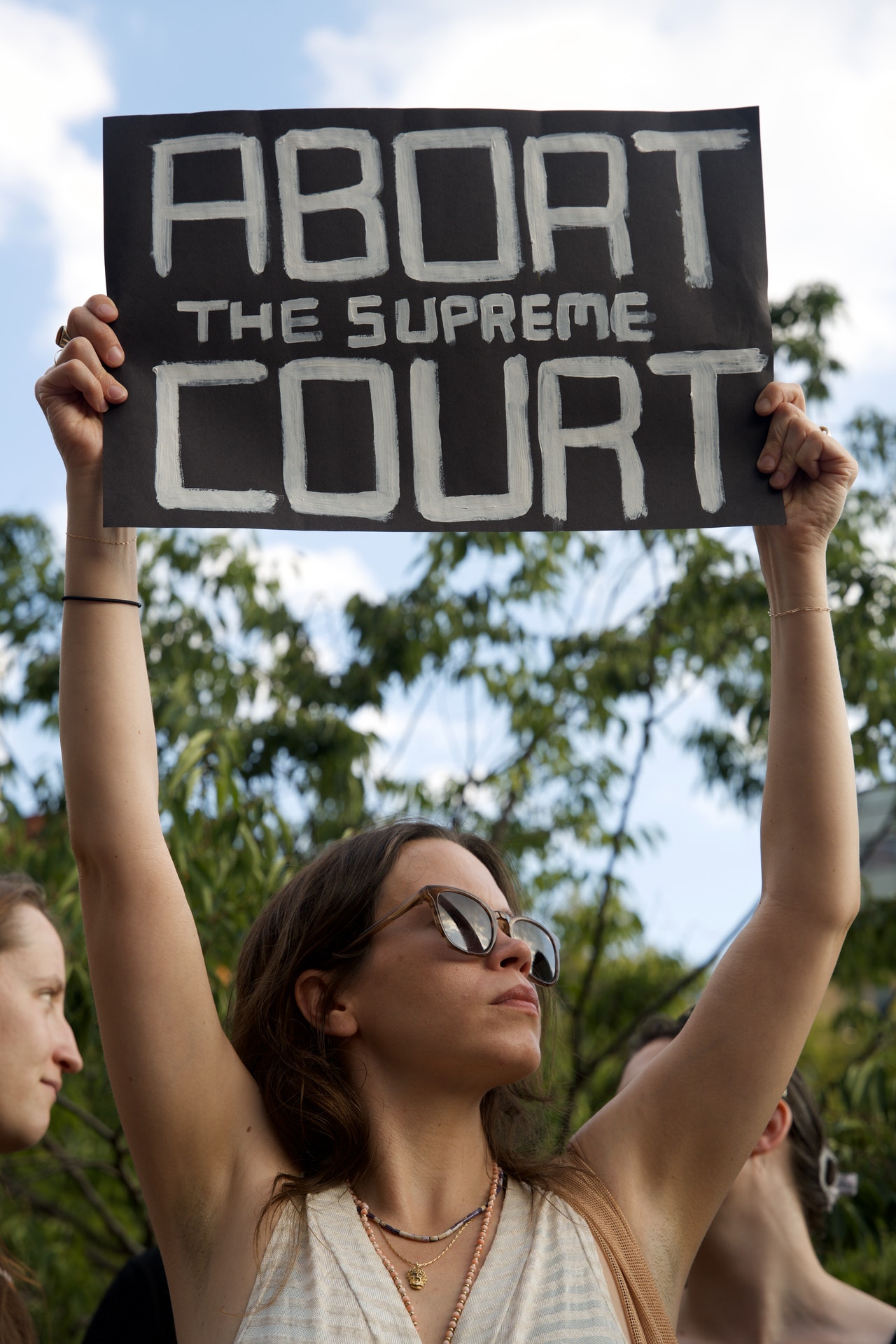I once crafted a small Jizo statue from clay for myself.
I didn’t need to be told he was a guardian of children. I felt it. He reminded and comforted me about the little ones I’d never get to meet, connecting me to my own soft heart without words or blame.
I felt numb at first when Roe v. Wade was overturned. I was absorbed in bringing closure to my work week, preparing for a sleepover my son was having with a friend. A notification on my phone as I was ordering pizza reminded me “what happened today.” My reaction resonated with our friend whose mom had just talked to him about it. Our serious tone piqued my son’s curiosity. “What?”
I provided a simple explanation about pregnancy and the choice women have whether to continue one or end it, a right they’re losing. He replied, “But that’s killing a baby.” I took that in, sighed, and paused before responding, “Well, yes, that’s the argument.” It wasn’t an argument to his tender 11-year-old heart, though. It was a genuine, innocent response, which helped me to hold that perspective much more gently. A beating heart is indeed a life.
I had three abortions before him, after his sister, hence the six-year difference in their ages. I remember feeling instinctively defensive when I saw that written in my medical chart. I was quick to clarify they were miscarriages. Spontaneous abortion, I learned, is the medical terminology. Okay.
They left a mark. I grieved each one. I blamed myself. I blamed the people involved in the experiences that damaged my sense of my worth and creative potential in the world. I didn’t know how else to explain what changed after one healthy pregnancy. I blamed my then-husband for one of them because the initial leak of amniotic fluid came as I, not he, was the one stomping on some cardboard boxes to fold them up for recycling. I giggled about it to him at first that evening, thinking I’d peed myself. The panic didn’t set in until the next morning when the bleeding began. All my thoughts of blame remained safely inside myself. I didn’t dare voice them. I wouldn’t want anyone to feel the kind of guilt I did.
It weighed heavily on me for years until I revisited the issue in an experiential training in EMDR, a modality for healing trauma. To highlight the implicit message, abortion is traumatic. I think I wasn’t given quite enough anesthesia for one of my D&Es. I became vaguely aware of my arms outstretched and immobile, as if pinned to a horizontal cross, with a forceful tugging sensation between my legs. I managed to communicate, “Um, I can feel that.” The next thing I was aware of was a nurse gently saying, “It’s all over,” and weeping.
I found some comfort in supposing the conditions of either my womb or the small bundles of life that weren’t sustainable. That left plenty of room to blame myself, either for my faulty DNA or uterus. The EMDR training was fortunately a more compassionate environment than I’d been able to provide for myself. In that context, a single question came to me—and an answer. Together they were like a key that opened the door to healing. If someone else had the same experiences, would I blame them? Oh my God, of course not.
Spontaneous is a strange oxymoronic word for something so traumatic. My body started the process spontaneously three times. Twice, I needed medical intervention to finish the job. I can’t speak from experience about abortions women chose, but I suspect the emotional aftermath is just as rough. There may be some who opt for it lightly, using it as birth control, but I can assure you the experience is harder to endure than taking a pill or using a condom. I imagine it’s more often a painful solution to an agonizing predicament.
My defensiveness about the term abortion had another layer. I recoiled at being seen as “the kind of person” who would choose one. My heart aches for all the women who’ve been wrestling with that in a fresh way daily or will be in the future. The pundits don’t know them or their circumstances. My heart also aches for the children who will be born into those circumstances with a mother lacking internal or external resources to care for them well.
I’m reminded of Hester Prynne in The Scarlet Letter, publicly wearing the A for adultery. I don’t remember the story well now, but I can do the simple math. She was singled out for public shaming, but it takes two to have an affair—and two to create a pregnancy. Why should the A, whether it stands for Adultery or Abortion, or Adam and Eve, weigh so much more heavily on the psyche of one gender? Why do women still carry such shame and blame for nonconsensual acts and the bulk of responsibility for consensual ones?
As a 20-something graduate student in counseling, I was once assigned the pro-life position in a debate on abortion. I think my professor did that on purpose as an exercise in setting aside my personal values to be able to ethically meet clients where they are. I’ve always been pro-choice. I didn’t think I’d be able to choose an abortion myself, but we never know how we’ll respond to an emotionally charged situation until we’re in it. Still, I did my research, prepared my arguments, and distilled them down to talking points. I don’t remember any of them now.
You know what I do remember? The cheap shot I took. I pointed out that I was dressed in white, while my opponent was dressed in black. I remember sensing her discomfort as she explained rather meekly that black is slimming. I wish I could reach back through the years and apologize for stooping to that level. I must have known unconsciously what I know all too well now: how quickly a woman can be undermined by implying she lacks virtue.
Abortion is a complex subject. I don’t pretend to be fully informed, but I suspect those of us who’ve been quiet and numb about the overturning of Roe v. Wade might have an important contribution. My silence and my belief that I can’t do anything about it makes sense in the context of my life. I’ve been undermined and rendered powerless in male-dominated systems for speaking up. I know I’m not alone, even though I feel like I am. It is obvious to me that we’re a long way from equal power or shared responsibility where either sexual behavior or family life are concerned, and that gap is widening.
What bothers me the most, though, is the lack of empathy for women who are suffering in a way that doesn’t fit neatly into a selfless, childbearing caretaker role. That hit home when I stumbled upon what I found to be a refreshingly compassionate point of view, which nevertheless elicited some comments that were more like attacks.
It moved me to connect with my feelings, not just my beliefs. As I reflect on my own experiences, I especially want to remember my interconnection with others.
I am so surprised what came out of me as I sat to write. I thought I was going to write about Carol Gilligan’s research on moral development outlined in her book In A Different Voice. Her classic study based on interviews with women facing an “abortion decision” led her to name something that’s always been there in the world. It was just missing in the academic literature generated by men with male subjects. The “ethic of care” is about responsibility to self and others, in contrast to the “ethic of justice,” which is more about competing rights. It’s characterized “not by gender but by theme.” Because it’s associated with femininity, however, both men and women tend to see it as the weaker, less relevant one.
I think it’s worth considering that another variable might be at play, affecting the course of the abortion debate. Narcissism is a clever chameleon that can mirror either voice fluently. It can profess an ethic of justice, an ethic of care, or no ethics at all with equally convincing fervor, depending on the situation. Narcissism is a force that covertly gains and maintains your trust and loyalty by eliciting strong emotional responses, using the things you care about most to further its own agenda, which is hidden. I suspect there’s another agenda bigger than abortion that’s profiting from all the divisive fighting.
Perhaps those of us with the greatest aversion to politics have voices that could enrich the conversation by opening our hearts and letting our stories pour out, instead of squaring off into our predictable corners.
I am grateful to Carol Gilligan for lending academic support to the notion that morality includes caring for ourselves and each other. It validates those of us who already know that with or without a PhD or research to back it up. Reconnecting with my own heart and voice in the places it’s become numb and silent may not save anyone or fix anything—yet—but it feels like the only trustworthy place to start.
~
Please consider Boosting our authors’ articles in their first week to help them win Elephant’s Ecosystem so they can get paid and write more.












Read 16 comments and reply